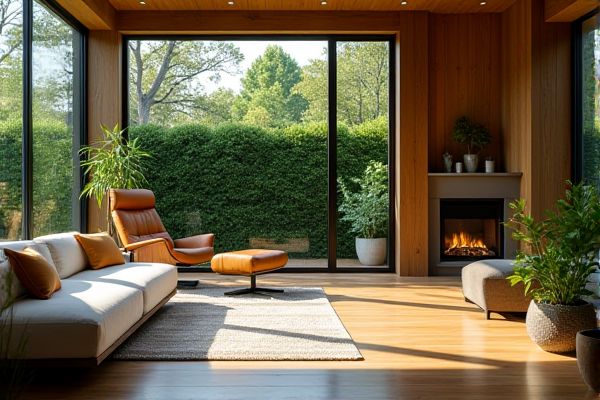
Privacy screens offer a quick, customizable solution for creating secluded outdoor spaces, while hedges provide a natural, eco-friendly barrier that enhances aesthetic appeal and supports local wildlife. Discover how choosing between privacy screens and hedges can transform Your outdoor living experience by reading the full article.
Table of Comparison
| Feature | Privacy Screen | Hedges |
|---|---|---|
| Material | Metal, plastic, fabric | Living plants, shrubs |
| Privacy Level | Immediate and consistent | Improves over time as plants grow |
| Maintenance | Low maintenance | Requires regular trimming and care |
| Durability | Long-lasting, weather resistant | Depends on plant species and climate |
| Environmental Impact | Minimal, non-living material | Positive, supports biodiversity and air quality |
| Cost | Moderate initial cost | Varies; initial planting and ongoing care |
| Aesthetic Appeal | Functional, limited natural look | Natural, enhances landscape beauty |
| Installation Time | Quick setup | Takes months to years to establish |
Introduction: Privacy Screens vs Hedges
Privacy screens provide immediate and customizable privacy solutions using materials like wood, metal, or synthetic panels, ideal for urban and compact spaces. Hedges, composed of dense, living plants such as boxwood or arborvitae, offer natural aesthetics, environmental benefits, and noise reduction but require time and maintenance to grow. Both options serve privacy purposes, yet their suitability depends on factors like space availability, maintenance willingness, and design preferences.
Defining Privacy Screens and Hedges
Privacy screens are physical or digital barriers designed to limit visibility and enhance personal space, often made from materials like wood, metal, or synthetic mesh. Hedges consist of dense rows of closely planted shrubs or trees that naturally create a living barrier, providing not only privacy but also aesthetic appeal and environmental benefits such as noise reduction and habitat creation. Both privacy screens and hedges serve to define boundaries and improve seclusion, but hedges offer a sustainable, green solution, whereas privacy screens provide immediate and customizable coverage.
Aesthetic Appeal: Modern vs Natural Look
Privacy screens offer a modern, sleek aesthetic with clean lines and customizable materials like metal, glass, or composite panels that complement contemporary architectural styles. Hedges provide a natural look with lush greenery and organic shapes, blending seamlessly into garden landscapes and offering seasonal variation in color and texture. Choosing between privacy screens and hedges depends on the desired balance between modern minimalism and natural beauty in outdoor design.
Installation: Ease and Time Required
Privacy screens offer quick and straightforward installation with minimal tools, making them ideal for immediate privacy needs. Hedges require planting and years of growth, demanding patience and ongoing care before achieving full coverage. Choosing between the two depends on whether instant privacy or a natural, long-term barrier is preferred.
Maintenance Requirements and Costs
Privacy screens typically demand lower maintenance costs and effort, as they often require occasional cleaning and minor repairs. Hedges need regular pruning, watering, and pest control, leading to higher ongoing maintenance expenses and time commitment. Your choice depends on whether you prefer a low-maintenance option or a natural, greener privacy solution with increased upkeep costs.
Longevity and Durability
Privacy screens made from high-quality materials like metal or PVC offer exceptional longevity and durability, often lasting over a decade with minimal maintenance. Hedges, depending on the plant species, can take several years to mature and require regular care to maintain their health and shape, but they provide natural resilience and adaptability to environmental changes. When durability and long-term performance are primary concerns, synthetic privacy screens generally outperform hedges in withstanding weather, pests, and wear.
Environmental Impact and Benefits
Privacy screens made from sustainable materials reduce waste and require less maintenance, minimizing their environmental footprint compared to traditional hedges. Hedges support local ecosystems by providing habitats for wildlife and aiding air purification, enhancing biodiversity. Your choice between the two influences energy consumption, carbon sequestration, and long-term sustainability in your outdoor space.
Effectiveness in Blocking View and Noise
Privacy screens provide a consistent and immediate barrier to block views, making them highly effective for maintaining visual privacy in small or transient spaces. Hedges offer a natural, aesthetically pleasing solution that not only blocks views but also absorbs noise, reducing sound pollution more effectively than many screen materials. Your choice depends on whether visual obstruction or noise reduction is the higher priority in your outdoor area.
Space Considerations: Urban vs Suburban Gardens
Privacy screens offer a compact solution ideal for urban gardens with limited space, allowing vertical growth without encroaching on valuable ground area. Hedges require more horizontal space and time to mature, making them better suited for suburban gardens where land is more abundant. Choosing between these options depends on maximizing privacy while accommodating spatial constraints in different residential environments.
Making the Right Choice for Your Property
Selecting between a privacy screen and hedges depends on your property's specific needs, maintenance capacity, and aesthetic preferences. Privacy screens offer immediate coverage and can be customized with materials like wood, metal, or fabric, providing a sleek, modern look with minimal upkeep. Hedges, while requiring more care, enhance natural beauty, improve air quality, and create a soft, organic barrier that matures over time, increasing property value and privacy.
 homyna.com
homyna.com